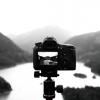1.Prologue
In our Adventures in Photography series, we’ve covered the following so far:
(1) The Three Big Japanese Camera Makers: Nikon, Canon, and Sony
(2) Alternative Japanese Camera Makers: Olympus, Lumix, Pentax, and Fujifilm
(3) Japanese Lens Makers and Camera Accessory Makers
(4) Photography Museums and Galleries From Shinjuku to Ebisu
This time, I’ve put together a list of camera and photography shops between Shinjuku and Ebisu—small bookstores selling photo books and art books, electronics retail stores, and stores selling used equipment.
2.Bookstores That Carry a Good Selection of Photo Books
As I’ve written about in this series so far, Japan has many world-class camera makers, lens makers, and camera accessory makers.
Japan is world class in terms of the quality of its printing services as well, and its publishing industry has roots in the print culture of the Edo period. The range of colors, color reproduction, and the quality of the ink and paper are all second to none. Professional photographers from around the world often go out of their way to have their works printed by a Japanese printing company.
If you’re looking to buy photo books, I recommend paying the premium to obtain a hardcover version printed in Japan. The difference between the Japanese version and overseas versions can be breathtaking.
●Daikanyama T-SITE
From newly published works to old and rare classics, Daikanyama Tsutaya carries a large selection of photo books from Japanese and international photographers. With an on-site Starbucks, this location has everything you need to get lost in pictures for an entire day.
<SHOP INFO>
Daikanyama T-SITE
●Tower Records Shibuya
Check out their books/magazines section on the second floor for a selection of photo books that skews toward music and movies. (Not to mention “gravure" idol books.) There is also a great selection of foreign magazines, which make great study materials.
<SHOP INFO>

Tower Records Shibuya
●NADiff BAITEN
NADiff is an art bookstore that sells books on photography, movies, theater, music, architecture, and more. The main location in Ebisu (now closed) had a gallery space that regularly hosts exhibitions. NADiff has a location in the Tokyo Photographic Art Museum. The name is short for “New Art Diffusion".
<SHOP INFO>

NADiff BAITEN
●On Sundays
On Sundays is the museum gift shop of Watari-um. On the first floor you’ll find stationery, postcards and zakka (miscellaneous items and curio), and downstairs is a cafe and a bookstore with an eye-popping selection of art, design, and photo books.
<SHOP INFO>

On Sundays
●Shelf
Shelf is located just a few buildings down from the aforementioned On Sunday. It sells art books you won’t be able to find anywhere else—everything from newly published books to limited editions and out of print works. Talk to the staff if you’re looking for recommendations, and also keep an eye out for discounted books.
<SHOP INFO>
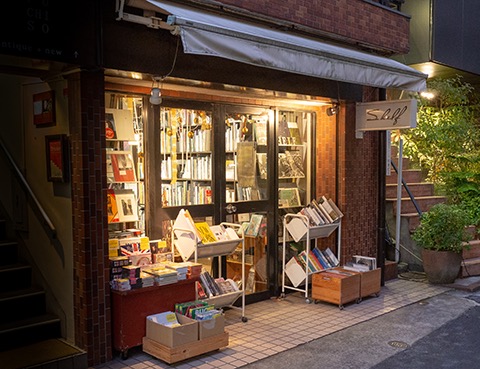
Shelf
●Totodo
This antiquarian bookshop sells books on art, photography, design, architecture, and more. And the books are more than just books—they’re artworks in and of themselves. If you’re interested in selling old books, check their website for details. There’s also an in-store gallery space.
<SHOP INFO>
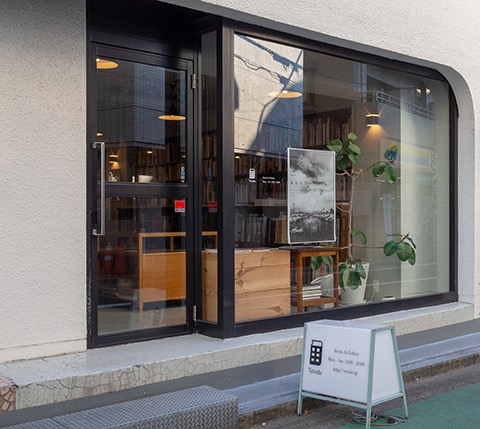
Totodo
●Dessin
Dessin, an antiquarian bookstore in Nakameguro, is the sister store of Totodo. It sells picture books from all around the world, as well as photo books and art books. There is a gallery space on the second floor.
<SHOP INFO>
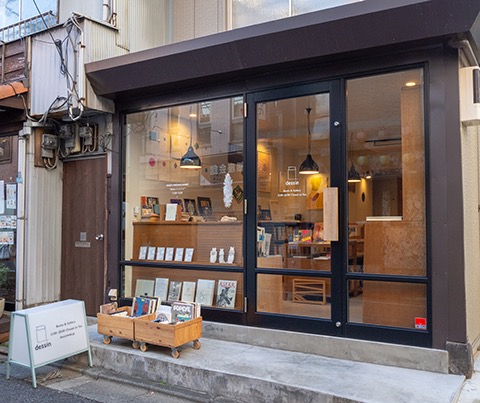
Dessin
3.Camera Stores in the Area Between Shinjuku and Ebisu
People looking to buy their first serious camera should go to Yodobashi Camera Shinjuku’s Camera Pavilion. The knowledgeable staff will walk you through the process and offer useful advice.
●Yodobashi Camera Shinjuku (Camera Pavilion)
Yodobashi Camera was founded in 1960 in Shibuya as Fujisawa Shashin Shokai. It opened its Shinjuku West location in the Yodobashi area of Shinjuku in 1975, followed by locations throughout Kanto and beyond. The Camera Pavilion is located just across the street from the Shinjuku West Main Store, and sells cameras, lenses, accessories—pretty much everything you could ever want camera-wise. The product selection is well thought out, and there’s something here for everyone from amateurs to aficionados. Adjacent to the Camera Pavilion is the Print Pavilion, where you can place your order via touch panel and have your pictures developed in about 10 minutes to half an hour. Whether you’re looking to have ID photos taken, photos printed out for a family album, or are printing out your favorite snapshots for the first time, the staff will guide you through the process.
<SHOP INFO>
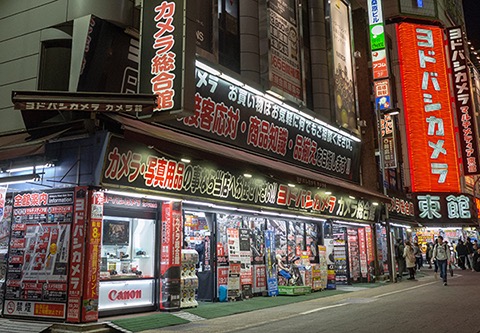
Yodobashi Camera Shinjuku (Camera Pavilion)
●Bic Camera Shinjuku West Store
Bic Camera was founded in 1968 as Takasaki DP Center Co., Ltd. in Takasaki, Gunma Prefecture. It moved to Ikebukuro in 1978, and has since expanded throughout the Kanto region and beyond. It is known today as a mass retailer of electronics, but it was originally a camera discount store. Compared to the other general camera stores around Shinjuku’s West Exit, Bic Camera is spacious and carries a wide variety of products. Beginners should be able to find everything they need.
<SHOP INFO>
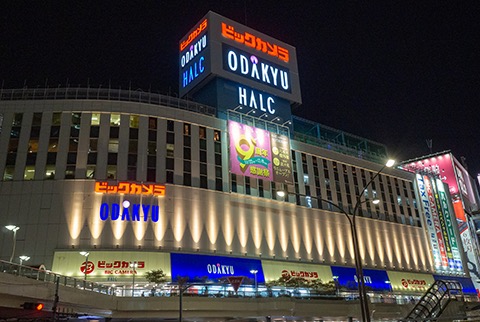
Bic Camera Shinjuku West Store
4.Used Camera Stores in the Area Between Shinjuku and Ebisu
For intermediate photographers, instead of spending all of your money on one new high-end lens I recommend looking into the wide variety of used lenses out there and buying several that pique your interest. If you are buying a camera body, I would always recommend buying new, because cameras age relatively quickly. But you can find quality used lenses at affordable prices.
If you don’t already have them, buy a super wide-angle lens or a macro lens, which are not everyday lenses but are great to have when you want to broaden your horizons. Put in the legwork and you’re sure to find the lens or lenses that will help take your photography to the next level.
●MapCamera Main Store
This store sells new and used cameras and accessories from both domestic and international manufacturers, and is known for its friendly, helpful staff. In October 2018, it opened a camera trade-in center on the 6th floor.
<SHOP INFO>
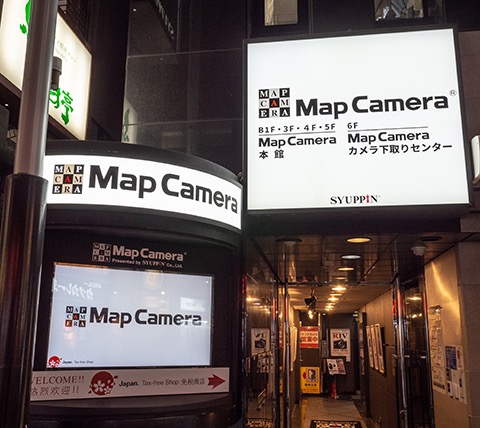
MapCamera Main Store
●Fujiya Camera
This long-standing camera store was founded in 1938. It carries a wide variety of new and used gear. Nearby is the Youhinkan (Accessories Building), which sells tripods and quick release plates and takes repairs, while the Junk Building sells used cameras and books about cameras.
<SHOP INFO>
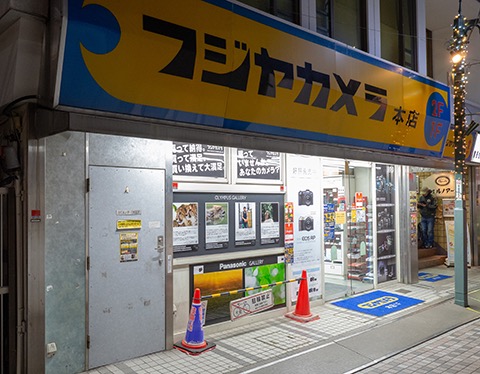
Fujiya Camera Main Store
Accessories Hall
Junk Hall
●Lemon Inc. Shinjuku
Lemon Inc., which is based in Ginza, sells high-end imported cameras like Leica and Hasselblad. They offer a wonderful selection of used film cameras and also do repairs. Even photography veterans and the most serious of aficionados should find plenty to keep them occupied.
<SHOP INFO>

Lemon Inc. Shinjuku
●Sanpou Camera
Digital cameras have now become the standard, but the vintage camera market has its share of devotees. Sanpou Camera is a good 15 minute walk from Gakugei-daigaku Station on the Tokyu Toyoko Line, but photographers make the trek for the fantastic lineup of rare cameras.
<SHOP INFO>
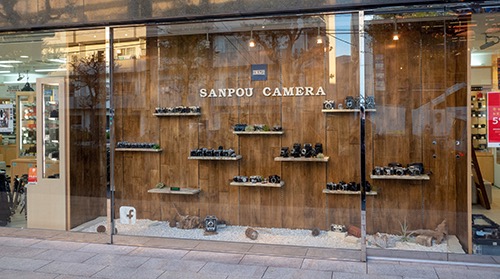
Sanpou Camera
●Shinjuku Used Camera Market
This store has a wide selection of used and consigned cameras and accessories. It is a popular destination for camera aficionados not only from around Tokyo but from the countryside and overseas. You’ll find digital cameras, compact cameras, vintage cameras, and large format and medium format cameras.
<SHOP INFO>
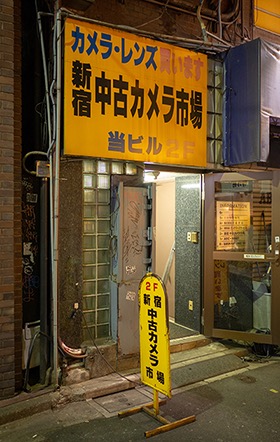
Shinjuku Used Camera Market
●Used Camera BOX
The concept for this used camera store is “classic cameras for everyday life". It has many regulars and sells only consigned goods.
<SHOP INFO>
Used Camera BOX
●Ogikubo Camera no Sakuraya
This general camera store in Ogikubo sells both new and used products. The message board on the official website is a place for users to post about photography techniques and skills, and there’s a sense of community that feels distinctly Ogikubo.
<SHOP INFO>
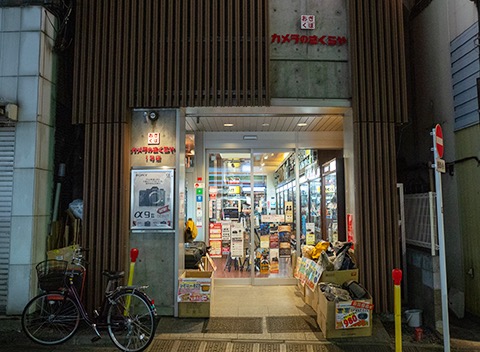
Ogikubo Camera no Sakuraya
5.Epilogue
Whenever I hit the town on the weekends, I take careful mental notes of the cameras I see out in the field, hanging around necks and on shoulders. And I’ve noticed something odd. A high percentage of Japanese camera users have a Leica, while foreign tourists and expats tend to have either a Nikon or a Canon.
If I see someone out there on a walk equipped with the latest Leica digital camera, good for them—they should wear that camera proudly. But when I see someone out there in a fishing vest, with a weathered prime lens affixed to a Nikon film camera, shooting on a Velbon monopod that’s scratched all over, holding a dented and bruised Hakuba aluminum case, well, then I know that person gets it.
